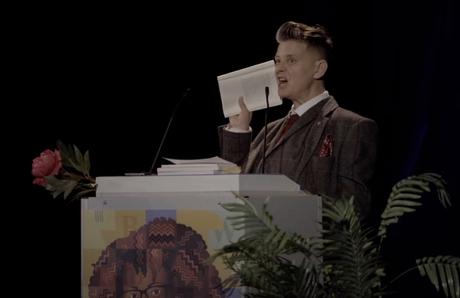A couple of weeks ago I was playing a theater game in which you have to stand in the middle of a circle and answer questions in quick succession.
“How middle class are you?” someone asked.

“I guess pretty middle class, but I’m from an immigrant background, so it’s complicated,” I fumbled, before moving on to the next question.
However, the question stayed with me for the rest of the week. I’m a writer, and I live a very middle class life. I play theater games in a studio once a week for Christ’s sake. It seems so obvious that anyone who does this is middle class that the questioner didn’t even ask what class I was, just where, specifically, within the middle I fell. But despite all this, I somehow cannot simply identify as middle class. I grew up with a single mother, in a Labour borough, surrounded by people who worked in factories, post offices and on buses.
The question of class really is complicated, and it was the fascinating topic of this year’s British Council Literature Seminar. The seminar, held over three days at Berlin’s diverse cultural center Oyoun, was curated by none other than Booker Prize winner Bernadine Evaristo. It also featured heavyweight working class writers Daljit Nagra, Wayne Holloway-Smith, Kit de Waal and Joelle Taylor.
But can you really be working class and a writer?
Every writer at the seminar struggled with the fact that people categorised them as middle class as soon as they published, got a PhD, or won an award.
Wayne Holloway-Smith pointed out that we assign arbitrary values to certain jobs, names or activities to indicate status in our society. But of course, these systems of value don’t really mean anything. Why is he given a higher position in society than his mate from school who’s a plumber just because he now has a Phd?
He explores this idea of the arbitrary assignment of higher and lower values in his poem Some Waynes, which is part of his reading in the video below. Holloway-Smith once googled his name and came across a Mumsnet thread in which someone categorised “Wayne” as the kind of character that would beat his wife and steal your hubcaps. It’s a working class name. It “screams council estate.” In this poem, he takes on these associations, plays them, shows the many versions of himself as well as the many other Waynes that he must also somehow navigate.
Indeed, identity is not fixed, and there is no straightforward way to determine class. It’s certainly not about money. We can see this if we take the example of another Wayne — footballer Wayne Rooney — who happens to be rich but is still working class. Reversely, as Kit de Waal pointed out, there are impoverished gentry who are still very much upper class. Class is about cultural capital, resources, how you speak, who you know, your accent and so, so much more. Joelle Taylor, a poet who writes a lot about the body (read her collection C+nto it is brilliant), pointed out that she came from a mining family and black lung was passed down the generations. You inherit it even if you’re poet.
Taylor was recently photographed for a big exhibition featuring working class butch lesbians. The photographers wanted to pose her in front of a council estate — stereotyping her as working class. She kept telling them that she was a poet, and maybe she should be photographed in a library or something like that. In the end they photographed her in a bar. “Do I stop being working class if I have books behind me?” she asked.

The stereotyping goes beyond pictures — it leaks into words. Working class people (much like Indian writers or any writer that isn’t white and middle class basically) are expected to write gritty working class stories set in council estates. It’s hard for working class writers to break into publishing with a sci-fi novel, or a story set in 18th century drawing rooms.
All this demonstrates just how profoundly society is viewed through a middle class lens. The implication is that a person like Daljit Nagra cannot occupy the position of value such the Chair of the Royal Society of Literature and be working class at the same time. However working class people have as much right to occupy these spaces as other people.
Kit de Waal who’s done a lot of work around getting working class writers seen and heard proved the point when she put together Common People: an anthology of memoirs from working class writers. She curated memoirs from well known working class writers like Majorie Blackman and as well as new working class writers — showing that there was no difference in quality. Working class writers just need to be given more space in publishing. The anthology also highlights the many different ways one can be working class.
De Waal, who is half-Irish, inspired a similar anthology for Ireland, where class is delineated very differently. For example, you could be land-owning and still working class in Ireland, whereas in England owning land generally makes you upper class.
Okay, so how does this relate to class in Germany?
As a British-born person in Germany, I can sense stark differences when it comes to class between the two countries. In the U.K, class is pervasive and severely limiting. When the writers asked the audience about class in Germany, a white German woman answered. She said that class was not so much of an issue in Germany because it was a post-war society. The death and destruction of the war resulted in mass migration, major rebuilding, and many people having to start anew, which somewhat demolished archaic class structures. Plus, the fact that German has no aristocracy, free education, and is less capitalistic than the U.K makes it a far more equal society.
While her points were valid, she totally ignored the intersection of class and race in Germany. You only have to spend a few hours with some Palestinian refugees in Germany to understand that there is a very definite underclass, and the discrimination and limitations they face in this society and system is just as brutal as in the U.K.
In Germany, race is not even measured which makes it harder to talk about discrimination and stereotyping based on things like race and religion. And awareness, willingness to acknowledge or talk about these topics, and even the vocabulary to discuss it is severely lacking. While the white woman was talking, the black woman from Oyoun who had handed her the mic was shaking her head, and all I could think was; I want to know what she had to say about class in Germany.
Look how I love you
At Kit de Waal’s reading, she said that she was inspired by a line that Holloway-Smith had uttered earlier on in the seminar. The line was, “look how I love you.” It had prompted her to write a flash fiction piece, which she then read out (see video below). It’s a great act of bravery and openness for a writer to read something out that they’ve literally just composed. And that’s how I felt about this entire seminar; it was illuminating and inspiring— maybe precisely because the writers were working class.
In the U.K, it’s considered vulgar or lower-class to show your feelings or be too open. The upper class never do it — even with their own kids. That’s why we have the stiff upper lip. But the absolute honesty, humor and generosity of the writers at this seminar was really special and helped me think about how I identify.
Of course, there are many different ways to be working class, and many different intersections that influence identity. But a feeling of what it meant to be working class writer did start to emerge during the seminar. It meant imposing yourself onto spaces and organisations that don’t want you, trying to change them and make them more inclusive, it meant code-switching, changing your accent, trying to use words you’ve only come across in books, being flexible, striving and aspiring but trying to remain real, it meant celebration and joy, feeling like you are neither here nor there, giving back to your community, producing groundbreaking creative work, subverting stereotypes, loving words and making them sing in your own way.
Maybe next time when someone asks me how middle class I am, I’ll say, “Not at all.”
You can watch most of the British Literature Seminar 2023 events on YouTube.
